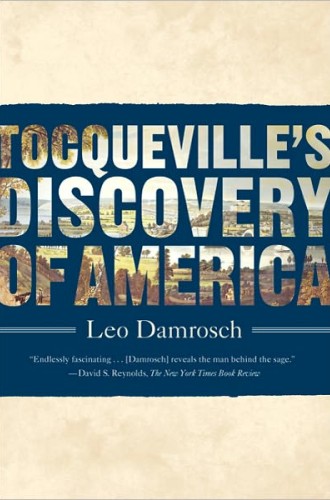Tocqueville’s Discovery of America, by Leo Damrosch
To European visitors in the first half of the 19th century, Americans were like their newfangled steamboats: noisy, combustible, always on the move—and dirty. "I hardly know any annoyance so deeply repugnant to English feelings as the incessant, remorseless spitting of Americans," Frances Trollope reported. Riding aboard one of the garish, belching behemoths on the Mississippi, Trollope observed that when Americans were not spitting, they were eating their food too quickly. And after that they picked their teeth with a pocketknife.
Charles Dickens also seemed to hold his nose as he passed through America. "In all modes of travelling, the American customs, with reference to the means of personal cleanliness and wholesome ablution, are extremely negligent and filthy," scowled the English novelist. The Americans he encountered aboard a crowded steamboat were tedious: "There is no diversity of character. They travel about on the same errands, say and do the same things in exactly the same manner, and follow in the same dull cheerless round."
Read our latest issue or browse back issues.
The image of American incivility lived on well into the 20th century. Americans were practical but artless. French avant-garde artist Marcel Duchamp complained, "The only works of art America has given are her plumbing and her bridges."
The most famous European observer of the American scene, Alexis de Tocqueville, spent plenty of time aboard steamboats and thought endlessly about the American difference while on his trip through the U.S. in 1831 and 1832. Yet he had fewer barbs for Americans than most. The steamboat had not yet caught on in Europe. Tocqueville was in awe of the enormous President, which ferried him and his traveling companion and trusted friend Gustave de Beaumont to New York. To his mother Tocqueville wrote: "It's impossible to give an idea of the interior of this immense machine. Suffice it to say that it contains three great saloons, two for men and one for women, where four, five, and often eight hundred people eat and sleep comfortably." An enormous boat for a vast continent.
Leo Damrosch, a professor of literature at Harvard, recounts Beaumont and Tocqueville's travels, telling of the landscapes they traversed, the women they met (who were frigid by French standards) and the wisdom they gleaned from all sorts of people: rich and poor, slave and free, men and women from one end of the nation to the other. The pair's "discovery" of America and Tocqueville's brilliant, discerning report, Democracy in America, are the stuff of legend.
Damrosch is a gifted writer with a flair for vivid, eloquent descriptions. Over a long career in literary studies, he has written on David Hume, Samuel Johnson, Alexander Pope and William Blake. His Jean-Jacques Rousseau: Restless Genius was a National Book Award finalist. Tocqueville's Discovery of America takes him into deeper historical waters. Skillfully weaving in original sources and the words of Americans and of European observers, Damrosch follows Tocqueville and Beaumont from New York to Detroit, from New Orleans to Washington, D.C., asking the reader to share in Tocqueville's discovery of a turbulent, changing society. "What Tocqueville eventually created was not an account of 'Americans' as a unique type," writes Damrosch, "but a structural explanation of some profound reasons why democracy, by its very nature, tends to produce certain characteristics in its citizens."
The two companions' official task was to survey the nation's penitentiaries for the French government. Of course, they explored much more than the country's forbidding prisons. They took notes on the way Americans conversed, the differences between various cities, the educational attainments of common folk, the economic prowess of citizens, tortured race relations in the North and South and widespread religious populism.
The free market of religion struck Tocqueville deeply. An agnostic with Catholic roots, Tocqueville could not quite make sense of the spectrum of beliefs. Methodist preachers seemed like divinity peddlers and Shakers appeared to have left earth entirely. The country was a crazy quilt of break-off sects and Protestant denominations. Yet, writes Damrosch, Tocqueville would later come to understand the social power of religion on American soil. Indeed, Tocqueville's discovery of the role that religion played in daily life ranks as one of his more important observations. It is surprising that Damrosch does not pay more attention to it.
"In France," wrote Tocqueville in one of the most memorable passages in Democracy in America, "I had almost always seen the spirit of religion and the spirit of freedom pursuing courses diametrically opposed to each other; but in America I found that they were intimately united, and that they reigned in common over the same country."
Plenty of Tocqueville and Beaumont's interviewees failed to impress them. Merchants and farmers were eager to drone on about the goods they sold and the crops they planted. The French were not so crass and boastful about their finances. It seemed unbearably boring, but Tocqueville recognized that Americans valued business acumen and what Washington Irving called "the almighty dollar." The American eagerness to talk shop and to proclaim the glories of their nation bothered Beaumont and Tocqueville as it did other European visitors.
The new nation enjoyed a geographic and cultural setting quite unlike that of the Old World. Tocqueville and Beaumont were not alone in picking up on the cues of a democratized culture. When the Englishman Frederick Marryat ventured through America in 1835, he found that "it is invariably the custom to shake hands; and thus you go on shaking hands here, there, and everywhere, and with everybody; for it is impossible to know who is who, in this land of equality."
Not put off by handshaking, Tocqueville and Beaumont were impressed by the equality they witnessed, evident in how men and women behaved, dressed, spoke and governed. In France, they bemoaned, an endless bureaucracy—"armies of clerks," in Damrosch's words—oversaw local initiatives, meddling in townspeople's affairs. Not so in decentralized America, where citizens were involved in everyday governance, and class disparity and the "prejudice of birth," so prominent in France, were surprisingly absent. Americans were not only free of class prejudice, in Tocqueville's rosy view, they also developed their own intellectual authorities, often shunning book learning and elites and experts of all sorts.
Yet there was a dark side to the American system. The country produced authoritarian types and anti-intellectual populists. The two young Frenchmen noted the ways that Americans did not live up to their best principles. The code of the penitentiary, says Damrosch, illustrated the gaping divide between the ideal and the reality. Tocqueville and Beaumont witnessed the horrors of solitary confinement, harsh punishment and absolute conformity. Their report on prisons for the French government concluded: "The prisons of the country present a spectacle of the most complete despotism."
The two also commented on the treatment of Native Americans and of blacks, both slave and free. (Beaumont made race relations the theme of his flawed novel Marie.) Indians, forcibly removed from their homelands, were tragic and heroic figures to them. In Tocqueville's imagination they were noble savages. "Lying on his cloak in his smoky hut," wrote Tocqueville, "the Indian regards the comfortable dwelling of the European with scorn." His view of slavery and the South, however, was far from romantic. Human bondage was immoral and "contrary to nature" in his estimation. Masters reduced their slaves to beasts and robbed them of the memory of their homeland.
Amazingly prescient, Tocqueville saw a bloody war on America's horizon. It seemed inevitable that the country would be torn asunder by the peculiar institution of slavery. If slaves did win their freedom, Tocqueville believed, deep-seated prejudice and discrimination would persist.
Damrosch concludes his readable, lively book by ruminating on the long-lasting relevance of Tocqueville's journey. Democracy in America is still in print, read every year by college students and countless others. Much has changed since Tocqueville and Beaumont worked their way through America's cities and hamlets, its backwoods and sparsely settled countryside. But still the popular mythologies of the West and of American exceptionalism, utilitarianism and self-help ideals live on, says Damrosch. "With sympathy and imagination," he writes, Tocqueville "understood why the new nation needed to think of itself in these ways, and also how the mythos had a real connection with American reality." Damrosch demonstrates conclusively why we still read and argue about Tocqueville and are enthralled by his discovery of America.






